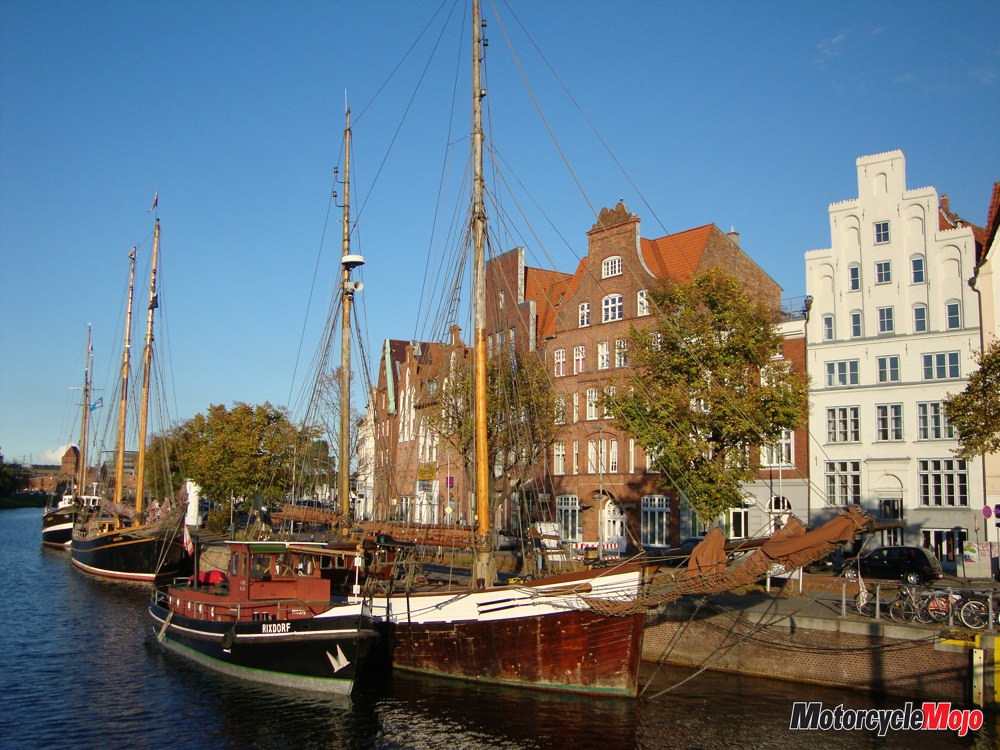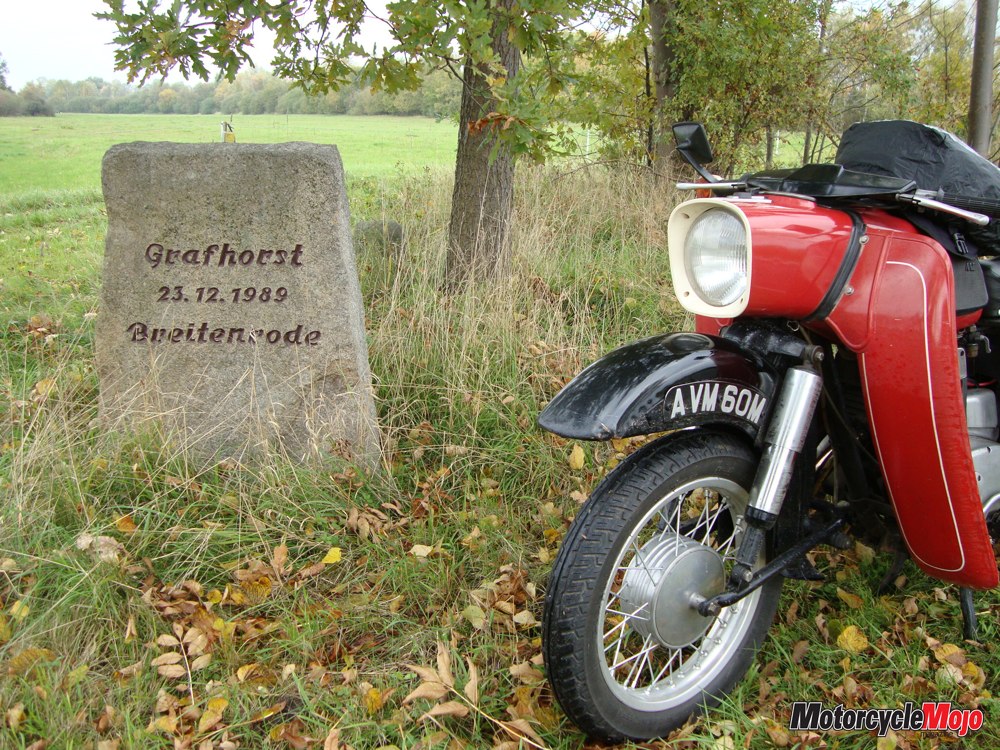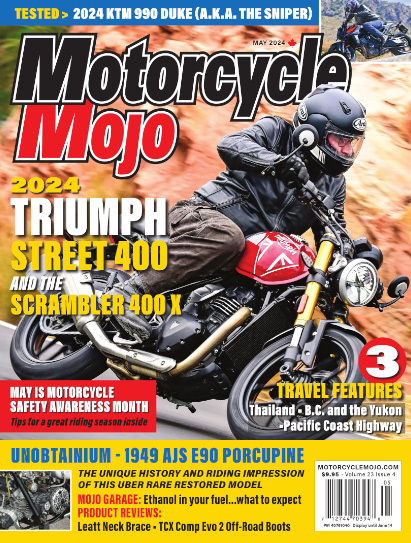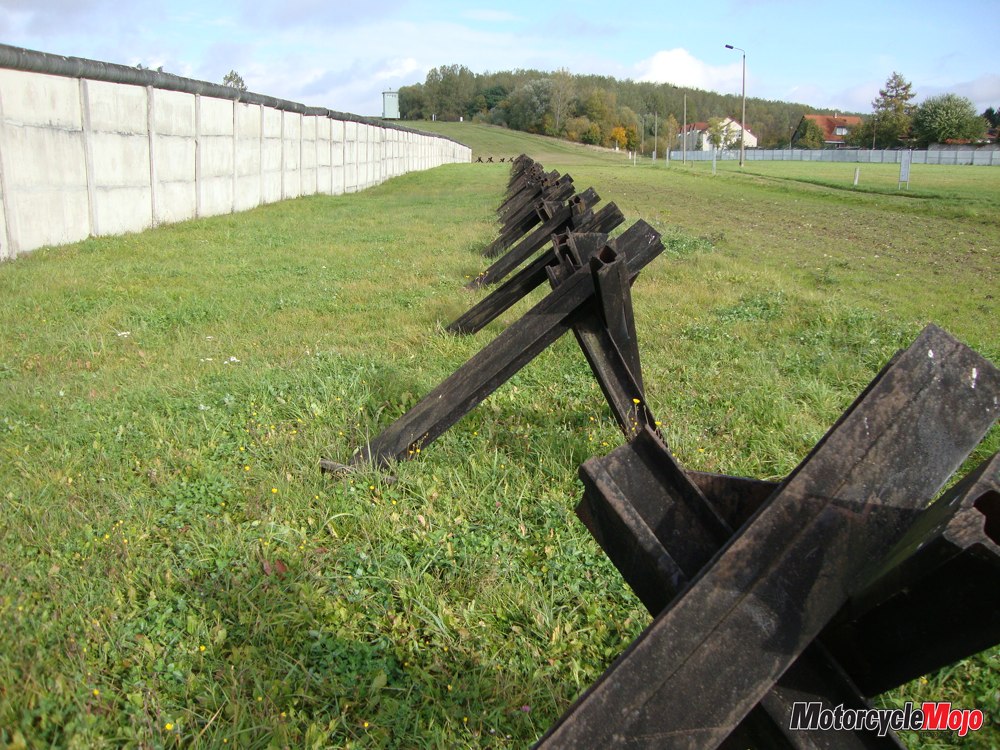Uncovering a forgotten treasure in the back of his garage, Paddy attempts to bring the MZ back to its homeland and take on a now-imaginary line that separated Europe into two distinct parts.
I had to mentally prepare myself before entering the garage. “This time,” I thought, “something’s gotta go.” Moving house is never easy, but moving garage is agony.
As I loaded the moving truck with tools, shelving and accumulated garage detritus, I looked at all the motorcycles and wondered exactly how it was that I could rationalize ownership of so many. The ST1100 was my daily rider, clocking up thousands of freeway miles as I rushed from meeting to meeting. Peggy, my Aprilia Pegaso 650, had taken me down the Americas, was utterly worthless, and as such, deserved to be ridden to Cape Town sometime in the future. My MZ Saxon 251 was the only bike I’d ever bought new, and although the little German-made, two-stroke single had registered 337,000 km and was a little tired, it still started and therefore could never be sold. And finally, languishing under a sheet in the deepest recess of the garage, was the 1970 MZ Trophy, probably the ugliest bike I’ve ever owned. It sat looking at me, resplendent in red and black, complete with leg shields. I wasn’t sure if it was the epitome of retro chic or just bland communist committee styling par excellence.

The four-speed, 243 cc, single-cylinder two-stroke was a 19-horsepower, piston-ported environmental disaster on wheels, and 16-inch ones at that. The 6-volt electrics meant lights were never a certainty, and the miniscule drum brakes only added to the hilarity because they were oval. In my twelve years of ownership, I had ridden it barely 3000 km and was mindful of the fact that when I did, dogs barked and small children cried.
Justifying it really was a struggle, so in a blaze of stupidity I thought I’d see if it would start, and decided that if it did, I’d ride it from the Baltic Sea to the Adriatic Sea along the length of the old Iron Curtain that used to split Europe in half. And then I’d sell it. Just one great valedictory ride.
After the house move, I attached the battery charger, turned the fuel on and kicked it over. A huge part of me sank to a new level of despair as the damned thing started. Three months later, I was arriving at the eastern English port of Harwich in the middle of a rainstorm. The night was cold, I was damp and the bike was on reserve as I pulled in to a gas station.
“Hello, love. Do you need petrol or diesel?” said the attendant as she came out to read the fuel pumps at the end of her shift.
Diesel? I’d been on the road for three hours but couldn’t comprehend how the engine could possibly sound that rough without my noticing. I pulled out my earplugs and started it up again, just to satisfy my curiosity. Everything seemed fine, so I can only assume it was the brutally agricultural styling that confused her. I wanted to shout “This ain’t no tractor!”
I was the last customer of the evening, and after completing the two-stroke oil-mixing ritual, I made my way to the ferry terminal for the overnight crossing to the Hook of Holland. There was no real queue, and certainly no other bikes. It appears that not many people travel to the Netherlands by boat in October, but the crossing was smooth and the glasses of draft Affligem Blonde in the cosy bar were even smoother.
I convinced myself it was a good omen for the journey ahead, but alas, the following morning down in the hold, I turned out to be the last to exit the boat. It appeared that the bike, now known as Zippy (with just a hint of irony), must have been apprehensive about mainland Europe and the journey ahead. She simply refused to start as all the other vehicles disembarked, leaving us alone on the car deck, the sound of my futile “kicking” echoing throughout the cavernous space.
Under the gaze of a line of high-visibility, jacket-wearing henchmen, she finally caught, coughing once or twice, and I gently coaxed her into life amid a cloud of noxious fumes. When we made it to Dutch customs and immigration, I was asked to stop, dismount and remove my flip-front helmet. They weren’t expecting the arrival of another vessel until late afternoon, so I can only presume the officials were suffering a case of premature boredom, as I was the last vehicle to leave the quayside. It was blowing a gale and pouring with rain. Flip-front helmet or not, the overbearing officer only wanted me to remove my helmet long enough to clear the top of my head, thus ensuring that my scarf was dislodged to generate maximum inconvenience. This wasn’t the cheery welcome I had envisaged from the peace-loving Dutch.
 I cleared the port and set out into the flat Dutch countryside, wondering where all Zippy’s power had gone. I rode for miles along dykes, following canals with windmills and red brick houses on both sides, and a ferocious headwind in front. I spent the day dancing on the gear lever, revving the poor little engine to within an inch of its life in third gear to achieve 80 km/h before plunging it into fourth and watching the speedometer needle gently descend back to 65 km/h and the centre of the truly asthmatic zone. It’s an area in the rev range where none of the 19 horses seemed to live. Then the process would begin again; rev to fever pitch, change up and slowly descend toward the truly pedestrian. Repeat until fade . . .
I cleared the port and set out into the flat Dutch countryside, wondering where all Zippy’s power had gone. I rode for miles along dykes, following canals with windmills and red brick houses on both sides, and a ferocious headwind in front. I spent the day dancing on the gear lever, revving the poor little engine to within an inch of its life in third gear to achieve 80 km/h before plunging it into fourth and watching the speedometer needle gently descend back to 65 km/h and the centre of the truly asthmatic zone. It’s an area in the rev range where none of the 19 horses seemed to live. Then the process would begin again; rev to fever pitch, change up and slowly descend toward the truly pedestrian. Repeat until fade . . .
Having crossed the border into Germany, I finally gave up outside Hamburg. The clouds had all gone, but the wind hadn’t. I was exhausted, but Zippy didn’t seem to notice. Shrugging off the ordeal with ease, the little bike ran happily at idle, the heavily finned engine bouncing wildly on its rubber mounts. With a clearing sky the temperature had plummeted, so I eschewed the idea of camping and found a hotel. I reached the top of a flight of concrete steps and with frozen hands, involuntarily released the grip on my helmet. As I watched it bounce all the way to the parking lot below, making contact with every other step, I was confident that it could take the blows. It was only a few weeks old and had cost me an extortionate amount of money, so I thanked my lucky stars that the day had ended so fortuitously.
Perhaps this was a more realistic omen for the trip ahead.
The following day, I rose late to avoid the worst of the frost and dealt with my accustomed disappointment at the lack of available tea. The staff offered me coffee or beer by way of recompense, but I find neither suits my palette first thing in the morning. The day was crisp and bright, but I was grateful that the wind had dropped, giving Zippy a fighting chance on the autobahns around and through the city of Hamburg. The warp-speed Mercedes and the thundering trucks did little for my confidence riding a machine designed to transport the faithful workers of the communist East to their local collectivized farms or factories. Even brand new, on a downhill slope and with a following wind, the MZ ES250/2 Trophy Deluxe (to give it its full and rather catchy title) would barely crack 110 km/h. The ravages of nearly forty years hadn’t supplemented this performance any.
Beyond Hamburg and safely back on smaller rural roads, I made it to the Baltic coast and parked Zippy on the exact point where the Iron Curtain had reached the sea until it was finally dismantled in 1990. Sir Winston Churchill coined the name in his famous speech of March 1946: “From Stettin in the Baltic to Trieste in the Adriatic, an iron curtain has descended across the Continent.”
He was undoubtedly prophetic, but turned out to be rather geographically inaccurate, as the curtain was to be pulled a whole lot further west, to the very point where I now stood, looking north at the calm Baltic waters. I lifted myself onto my tiptoes in a vain attempt to catch sight of Sweden.
In 1946, Churchill’s curtain was a metaphorical one, but it was soon to become all too tangible, and here at Priwall, a small beach resort near the northern German coastal town of Travemünde, all that fencing, the rolls of barbed wire and the concrete tank-traps continued into the salt water, ensuring that no one nipped around the edge. To deal with any swimmers, the East German (DDR) authorities employed watchtowers equipped with snipers – and a fleet of armed rapid-response boats, which, I hasten to add, weren’t built by MZ. In the battle for hearts and minds that persisted throughout the Cold War, the DDR always professed that the Iron Curtain was there to protect the people of the East from the imperialist Western forces of fascism who wanted to break through. But before it was completed as the impenetrable barrier we all remember, 3.5 million East Germans had fled the other way, so perhaps the ad campaigns carrying their “special message” needed a little more thought. The power of our own propaganda led my youthful mind to believe that everything on the other side of the Curtain existed only in black and white – cold, harsh and unforgiving – but now, with the watchtowers gone, the beach clearly continued its unbroken, beautifully colourful course along the coast. The village of Priwall, although technically in the West, was completely isolated due to the winding course of the border. It was only accessible by water, and became famous both as a nudist colony and the one place where the DDR border guards were happy to be posted, no doubt to keep a very close eye on the decadent naked capitalists.
My plan was to visit museums along my route south from this point and talk to those whose lives had been directly affected by what was, in essence, a political line in the sand. To that end, I drew my own line in the sand with my right foot, which was a little pretentious I know, but it made me feel as though I was giving the trip some gravitas. Then I turned Zippy around and prepared to ride south. I had a 1985 map of Germany in the tank bag, which clearly showed the old division, and I planned to stick as close as possible to its route. I knew that this would mean riding the old military tracks that the border patrols once used, if and when I could find them, and this gave me a certain thrill. It may be over twenty years since the curtain was pulled back, but those border tracks were patrolled on machinery exactly like Zippy.
Thousands of MZs were used to watch for those breaching the divide, their riders trained to shoot to kill, a feat which, sadly, they achieved all too often. More realistically perhaps, and since restitution has been ongoing for so long, I imagined I’d ride some crazy zigzag route, crossing rivers on rebuilt bridges and following thoroughfares that had once been destroyed to halt or control travel. A similar landscape existed in my native Northern Ireland, as I grew up only a few miles from the border with the Republic at a time of some political uncertainty. It was an area of concrete barriers, piles of earth, ripped up tarmac and dismantled bridges. For now, at least, riding in what had been a very contentious area of the two Germanys, Zippy was creating the desired effect as I bumbled along. Everyone aged over thirty turned to face the approaching sound, the distinctive ring-ding-ding of a two-stroke single emasculated by an exhaust pipe the size of a Howitzer. Looks of recognition spread across their faces, some smiled and waved, others grimaced, all with memories ignited. The vehicle of choice, not just for the workers, but for military patrols and even the dreaded Stasi secret police and its informants, Zippy inevitably rekindled lasting memories or associations.
The under-thirties just laughed at the guy on the ugly little bike that was holding up all the traffic. No recognition, no connection with a previous time, other than perhaps a history lesson about a divided country they could never recognize. Of course, I felt it wouldn’t be right to start the journey in earnest without first toasting my arrival at the starting point, so I found a youth hostel in the ancient Hanseatic town of Lubeck, rode Zippy up a couple of steps to park in the rear patio area, and set out to explore the beautiful town, rebuilt after intensive Allied bombing during the Second World War. As I sat in a bar chatting to the friendly regulars, I realized I had almost a month of riding ahead of me as winter loomed, but I felt confident that if Zippy couldn’t perform, it really wouldn’t matter. After all, breakdowns only improve most journeys, and this was the land of its birth; spare parts should still be available, and I was bound to meet more of these friendly locals. Unfortunately, after I started the journey along the wall’s path, a combination of excessive snowfall and the loss of one of Zippy’s gears meant that I never made it to the Mediterranean coast. Instead, I limped back to the English Channel, boarded a ferry to England and endured what was to be one of the roughest sailings of my life. I’ve decided to rebuild the gearbox and set off next year to complete the trip and then, at last, put Zippy up for sale.































































